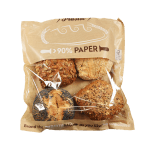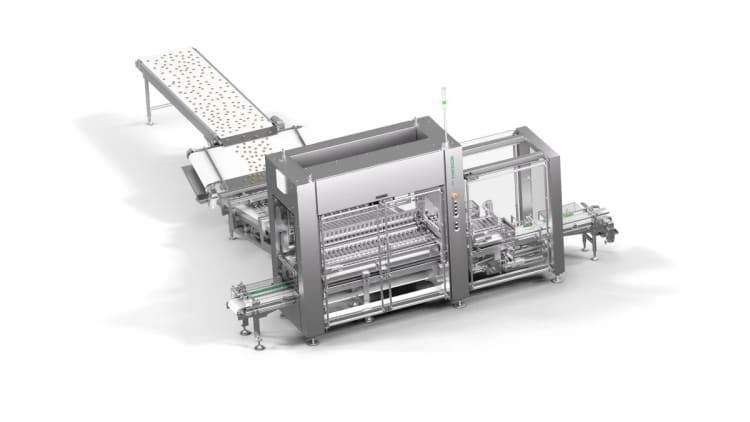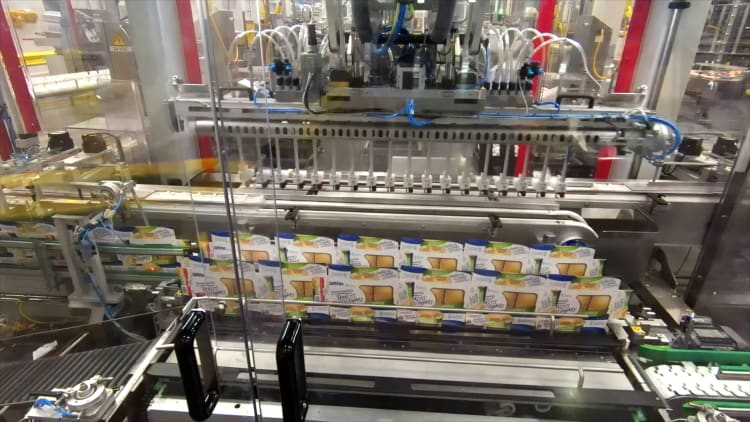
The bakery industry is undergoing a profound transformation driven by changing consumer expectations, skills shortages and rising cost pressure. Packaging solutions for bread, croissants, yeast rolls, cakes and biscuits are now expected to be sustainable, economical and technologically flexible at the same time. Manufacturers are increasingly relying on recyclable, compostable or bio-based materials while at the same time automating packaging processes and integrating digital monitoring and control. Interpack 2026 in Düsseldorf will present a wide range of such systems, spanning paper-based primary packaging, high-speed flow-wrapping lines, gentle counting and feeding units, as well as robotics and AI platforms for quality assurance and predictive maintenance.
Sustainability has become a key design parameter in bakery packaging. Numerous producers are working with paper-based solutions, PLA films and monomaterial structures that facilitate recycling. At the same time, product protection remains essential to avoid premature spoilage and unnecessary food waste. This combination of shelf life, hygiene and resource efficiency is reflected in the latest packaging concepts and machine technology that will be on show at interpack.
Paper-based bakery packaging and barrier requirements
Weber Verpackung, an interpack exhibitor, has developed the Baker Bag for self-service counters. The primary packaging is based on paper and can be equipped with viewing windows made of thin transparent recycled film or transparent paper in the form of glassine. When a glassine window is used, the complete bag can be disposed of in the waste paper stream for recycling. The approach reduces plastic content compared with conventional foil bags, while maintaining visibility of the product at the point of sale.
However, functional barriers remain critical, particularly for vending machine bags used in the automatic packaging of bread and baked goods. To maintain freshness, these structures must limit the exchange of water vapour and oxygen. At present, such barrier properties in paper-based concepts are only achievable via plastic coatings, film laminations or coatings with a polymer-containing layer. Although these solutions still contain plastics, the proportion is significantly lower than in full plastic film packaging and allows manufacturers to move towards more sustainable material combinations without compromising hygiene and shelf life.

For fresh baked goods, Weber offers Baker Bags made of paper with a viewing window made of film, recycled film or glassine. (Image: Weber Verpackungen)
Automation, robotics and AI in bakery packaging
In parallel with material development, automation is becoming indispensable due to labour shortages and the need for higher process reliability. Robotics and artificial intelligence are increasingly used for the precise, gentle handling of fragile baked goods. Modern lines employ camera-supported detection systems that analyse shape, position and product quality in real time, ensuring that only flawless items are packed. This reduces waste and stabilises line efficiency. At the same time, format changeover times are reduced, which is particularly important for smaller batch sizes and frequently changing product variants.
Digitalisation enables networks of machines, sensors and control systems in baked goods production that work together as intelligent overall systems. Process variables such as temperature, sealing quality or material consumption are continuously recorded and automatically evaluated. Platforms such as VisionAI use AI-based image analysis to detect deviations immediately and adjust machine parameters in real time. Predictive maintenance is gaining importance as well; by analysing machine data, potential failures can be identified in advance and downtimes minimised. These smart factory concepts are no longer reserved for large industrial bakeries but are increasingly being implemented by medium-sized baked goods manufacturers.
Robotic systems for sensitive and irregular products
Robotics, sensor-based control systems and AI demonstrate particular strengths when handling sensitive or irregularly shaped products. Gerhard Schubert GmbH has developed the Cobot tog.519, which combines AI-supported image recognition with flexible robot kinematics. The system can pick up a wide variety of baked goods, including unsorted products, at up to 90 cycles per minute. New product formats can be introduced quickly by using tools from a 3D printer, reducing both changeover times and investment requirements.
Versatile packaging solutions suited to small and medium batch sizes are in high demand in the biscuit and baked goods segment. Many users work with limited floor space, so compact machine layouts are increasingly important. Schubert’s technology addresses this requirement with manoeuvrable, space-saving robots. The French biscuit producer Nutrition & Santé has integrated such systems into its production. The cooperation was initiated at interpack 2023, where the packaging machine manufacturer presented a new, efficient feeding system for pre-cut box parts. Following the trade fair, Nutrition & Santé opted for a line comprising a flowpacker, a cartoner and two single-lane A3 erectors. The system packs a total of 13 different types of biscuits, including rectangular and round biscuits, chocolate-nut variants and filled bars. The central unit is the flexible TLM cartoner, which can handle seven bag formats and cartons.
Gentle counting and feeding solutions for biscuits
For the efficient packaging of biscuits, precise and gentle grouping systems are crucial. Syntegon has introduced a new counting system designed for this task. The FGCT counting feeder is intended to minimise product damage, increase efficiency and reduce waste. It gently groups biscuits into the required quantities and places them upright either in trays or directly into the infeed of a flowpacker.

The new Syntegon counting feeder groups biscuits particularly gently and places them in cardboard or plastic trays or in flowpackers. (Image: Syntegon)
Fuji Packaging also offers solutions for sensitive baked goods with its Alpha Wrapper systems, which provide resealing options and opening aids. Space-saving, chainless film guides allow flexible handling of different formats, while Fuji sealing technology is designed for the processing of modern, sustainable and recyclable packaging materials. The Hamburg-based company, which has been selling flowpackers from the Japanese manufacturer Fuji Machinery in Europe for over four decades, also supplies solutions for modified atmosphere packaging. These include the Pre-Vac system, in which products are first evacuated and then flushed with inert gas to extend shelf life.
High-performance flow-wrapping and heat-sealable papers
Innovative strength in bakery packaging is equally evident in high-performance lines. JTM Foods, a US-based manufacturer of snack pies, uses JT Advance horizontal flow-wrapping machines with contactless feeding from Italian producer Sacmi Packaging & Chocolate in its new plant. The fully electronic, servo-controlled systems can be configured for various formats, including flat pouches, side-gusseted pouches, pouches with offset sealing, pouches with tear strip and on-edge packaging with longitudinal and transverse sealing. Line speeds of up to 200 cycles per minute are achievable when processing heat-sealable paper films.
Individually 3D-printed forming shoulders play a key role in this configuration. They help to prevent material breakage, which in turn enables stable high-speed packaging and consistent pack quality. The primary packaging system is complemented by compact secondary packaging equipment such as the IER 030 toploader and the F-EL carton erector, both designed to deliver high output in confined spaces.

The IER 030 toploader places 400 bags per minute into the secondary packaging. (Image: Sacmi)
Vacuum cooling integrated with thermoforming lines
Further efficiency potential lies in the integration of cooling processes with packaging lines. A vacuum application has been introduced that transfers the cooling process directly to the thermoforming packaging machine. Using vacuum cooling, baked goods can be packed immediately after baking, as the temperature drops from approximately 95 degrees to around 30 degrees within a few seconds. This approach reduces the energy required for conventional cooling, cuts the floor space needed for separate cooling systems and lowers the risk of product contamination during intermediate handling.
Live demonstrations at interpack 2026
From 7 to 13 May 2026, visitors to interpack in Düsseldorf will be able to see live demonstrations of how sensitive baked goods are produced and packaged using the latest material and machinery concepts. The trade fair will bring together solutions for sustainable packaging materials, robotics, AI-based quality control, high-speed flow-wrapping and integrated cooling. Further information on the event is available at www.interpack.de.


